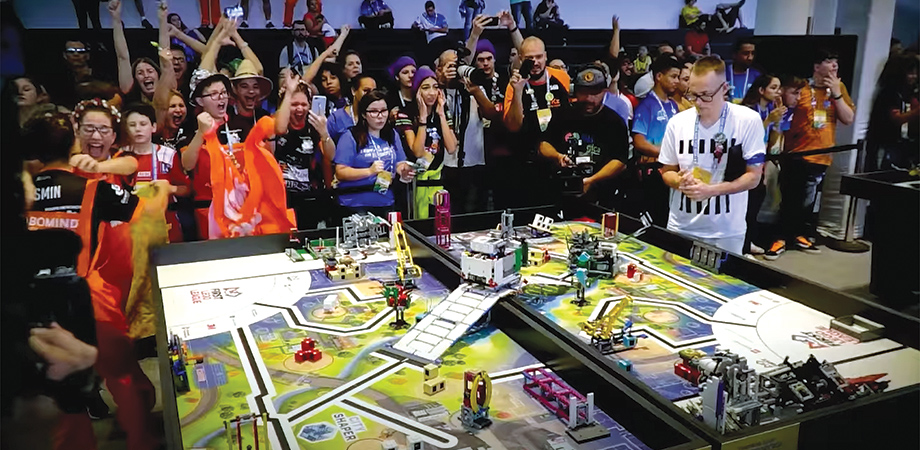Volunteering: Nothing to lose, much to gain

Students and recent graduates often find themselves caught up in the catch-22 cycle of "I can't get a job because I don't have experience; I can't get experience because I don't have a job." Experience has long been the best teacher, and volunteering is a great way to broaden and diversify your experiences and develop important skills. Volunteer work also looks great on a resumé as it shows a prospective employer that you're committed to your community and you have skills, connections—and, yes, hands-on experience—that will be valuable in the workplace.
Many people who are already busy with jobs and personal lives make time to volunteer. When they are energized by that experience, it drives them to keep up that good work.
While wearing many hats on two different continents, David Sampson, Pro-Vice-Chancellor of Research and Innovation at the University of Surrey and head of the Optical and Biomedical Engineering Laboratory at University of Western Australia, finds time to "do a bit of everything" as a volunteer, including organizing public science-related events and working with science fairs. "Volunteering is about building community and about giving back," says Sampson. "It creates opportunities—for you and for others. It builds skills, networks, and experience. It is part of a well-rounded professional-and it is rewarding to make a difference."
Volunteering also adds versatility: Through volunteer work, you can build and improve not only hard skills such as computing or writing, but also soft skills such as communicating with colleagues, working on a team, or organizing projects—all of which will prove useful as you advance in your career.
Jennifer Barton, professor of biomedical engineering, electrical and computer engineering, optical sciences, and agriculture and biosystems engineering at University of Arizona (UA), notes the eye-opening experience of volunteering with the Engineering, Science, and Technology Policy Committee (ESTeP) at SPIE. "I've come to realize how much US and international government policy positions affect my day-to-day activities as a faculty member and leader of a research institute."
Along with her many professor hats, Barton is also director of the BIO5 Institute at UA, which works with researchers from several scientific disciplines to develop solutions for issues such as treating disease, feeding humanity, and preserving livable environments. "BIO5 does a ton of outreach," says Barton, "including a huge ‘Science City' fair in the spring, and a high school internship program in the summer. I love the energy and enthusiasm of our future engineers and scientists."
According to her, there's great satisfaction in stepping out of your comfort zone and volunteering for a committee with a professional society "through which you can extend your skills and learn something new."
Volunteering for various committees outside of or within your current organization allows you to try your hand at new skills and challenges. As you work through these situations, you will also be creating opportunities to learn more about yourself. Are you an introvert who wishes to be more of an extrovert? Are you an extrovert who needs to learn to listen more? Do you enjoy hands-on work or prefer coordinating and delegating work? What projects make you feel particularly inspired and fulfilled?
Through volunteering, Matt Posner, a process scientist at Excelitas Technologies, says he has met people who have given him the opportunity to work on exciting collaborative projects that have led to career growth and progress in his own work. "It's been a long path from my first attendance at an SPIE Student Chapter meeting to chairing a governance committee that helps define programs for students and early career professionals," says Posner. He describes these platforms as "great places to start and develop my online and in-person involvement." His advice to would-be volunteers is "be present, listen, be curious, and be prepared to help."
As any job-hunting or career-building website will tell you, there are three important things to keep in mind: networking, networking, and networking. Volunteering gives you the chance to expand your network and make new contacts. These contacts may later serve as references or lead you to bigger and better opportunities-and, of course, you may be able to help them someday. Working within a network will also raise your awareness of current trends, issues, and resources in your community, which will give you insight as to how you might be able to help.
Tom Scheffelin, an engineer at California Air Resources Board, has long been involved in STEM activities with Scouts BSA. While attending a national meeting of the Society of Manufacturing Engineers (SME), Scheffelin, chair of the SME central western region, met the superintendent of a local school district in the hotel elevator. Since they were both wearing conference badges, they struck up a conversation.
"I mentioned I was looking for STEM ideas for elementary and middle-school students and he told me about First LEGO League, a recently created robotic contest for children aged 9-16," says Scheffelin. "So, my SME region provided LEGO robot kits for four local elementary and middle schools." This work inspired further volunteerism when local scouts working toward Eagle Scout volunteered to build First LEGO League playing fields for the four schools.
When it comes to volunteering, Scheffelin suggests "starting small, with something you are passionate and knowledgeable about. Younger students in classrooms will love it! The rest will follow."
Volunteering not only expands your network but can also help you find a mentor who can guide and encourage you in your profession. As you gain more experience, you may find yourself eventually mentoring others.
Anne-Sophie Poulin-Girard, a research associate at Université Laval (UL), began her volunteering-in-STEM career as an undergraduate student when she worked with the SPIE Optics Outreach Games.
That activity inspired Poulin-Girard to help organize the annual engineering challenge at UL called Coupe de Science. In addition, she's been a judge at Expo-Science (Québec's official science fair), and has volunteered with Les Filles et les Sciences (Girls and Science), an annual event aimed at introducing girls from ages 14 to 16 to science and technology.
"What I am proudest of," says the very busy Poulin-Girard, "is the young people in my community who took over from me and my colleagues after we graduated. They are enthusiastic, creative, and hard working. They provide continuity to projects and create their own. I see them becoming young professionals and supporting each other through their involvement and it is wonderful to witness."
To those considering volunteering, Poulin-Girard says, "Just try it! As scientists and engineers, aren't we trained to explore paths that can expand our horizons? And there is nothing to lose—except for maybe a little bit of your time—and so much to gain in the long term."
Karen Thomas is the Bandwidth editor for Photonics Focus.
| Enjoy this article? Get similar news in your inbox |
|



